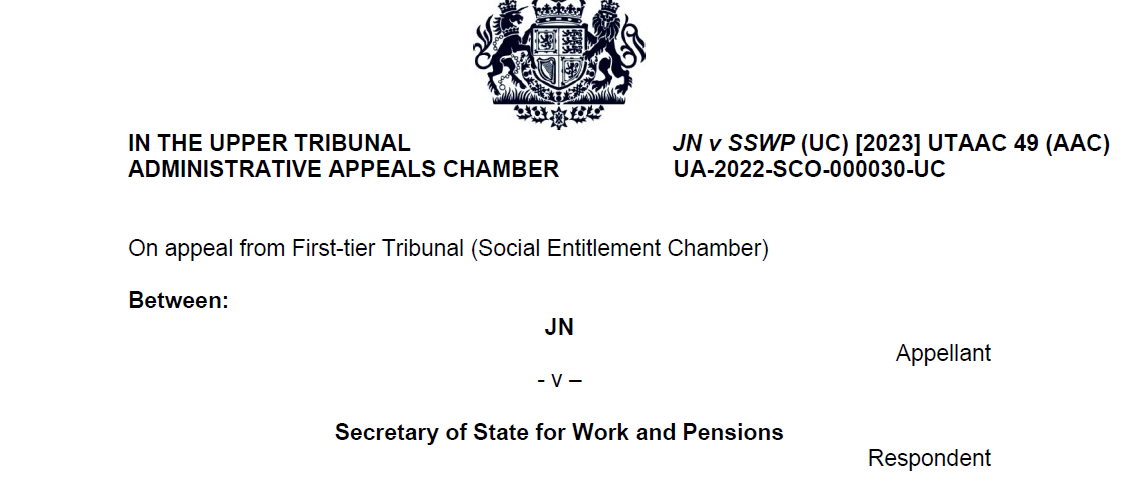Govan Law Centre (GLC) has been successful in a UK social security test case concerning the payment of Universal Credit (UC) to workers.
In JN v. Secretary of State for Work and Pensions [2023] UT 49 (AAC) the claimant was a hospital worker who was paid monthly on the last Wednesday of each month. This meant that on four occasions in 2020, two of her salaries were counted within the same UC monthly cycle.
She was treated as earning double which was clearly untrue. This resulted in nil claims and ineligibility for UC for one third of the year – because UC was assessed on real time information from HMRC which didn’t consider earnings over the salary cycle.
The UC earned income calculation is set out in Chapter 2 of Part 6 of the Universal Credit Regulations 2013 (“the UC Regs”), and in particular regulations 54 and 61 of the UC Regs.
In SSWP v Johnson and others [2020] EWCA Civ 778, the England and Wales Court of Appeal declared that the UC earned income calculation was irrational and unlawful as it applied to workers like Ms JN.
The UK Government remedied this irrationality by introducing the Universal Credit Earned Income Amendment Regulations 2020. These came into force on 16 November 2020, but amendments were not retrospective.
Accordingly, the case of JN was a legacy case concerning the legal effect of the court’s declaration of unlawfulness in Johnson.
The Secretary of State for Work and Pensions’ position was that because changes to the UC Regs in 2020 were not retrospective, the First-tier Tribunal had been correct to apply the law as it stood before those changes. That was so, the UK Government argued, despite such law having been declared by a senior court to have been irrational and unlawful.
The UK Upper Tribunal’s judgment was given by Upper Tribunal Judge Wright. The appellant was represented by GLC’s Mike Dailly, Solicitor Advocate; the respondent was represented by Graham Maciver, Advocate. The case had been referred to Rachel Moon, Senior Solicitor at Govanhill Law Centre from CPAG in London via Stirling Council’s welfare rights office.
The Upper Tribunal considered in significant detail the applicable and relevant case law on the legal effect of a declaratory order in the UK.
In allowing the appellant’s appeal, Judge Wright held that: “56. All of these considerations lead me to conclude that the Court of Appeal intended the declaration to have effect (that is, bite) at least from the date of the Secretary of State’s UC entitlement decisions under challenge before it. Such a conclusion means that the declaration also has effect in terms of all four of the UC entitlement decision made by the Secretary of State concerning the appellant on this appeal …
57. The same result may be obtained in respect of this appeal by way of a different analysis. The above conclusion is based on the terms of the declaration made by the Court of Appeal, as informed by that court’s reasoning. However, the Court of Appeal was not itself exercising an original judicial review jurisdiction on the claims for judicial review. It was exercising an appellate function on the Secretary of State’s appeal from the order of the High Court of 24 February 2019 in which the judicial review claims had succeeded. The Secretary of State’s appeal was dismissed, save for the declaration made by the High Court being replaced by the declaration set out by the Court of Appeal in its order. The appeal being dismissed meant that the High Court’s order that the judicial reviews succeeded remained as the operative order with effect from 24 February 2019 but with a different declaration applying from that date within that order. In other words, the composite order of the High Court of 24 February 2019 is to be taken to read:
“The Claimants’ applications for judicial review are allowed to the extent that it is DECLARED that the earned income calculation method in Chapter 2 of Part 6 of the Universal Credit Regulations 2013 is irrational and unlawful as employees paid monthly salary, whose universal credit claim began on or around their normal pay day, are treated as having variable earned income in different assessment periods when pay dates for two (consecutive) months fall in the same assessment period in the way described in this judgment.”
